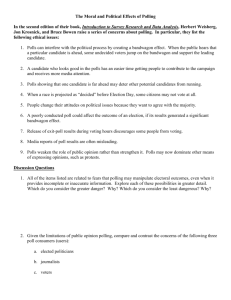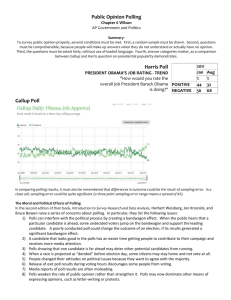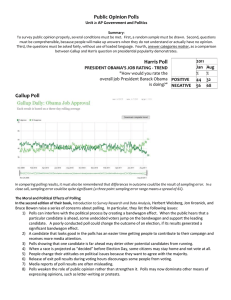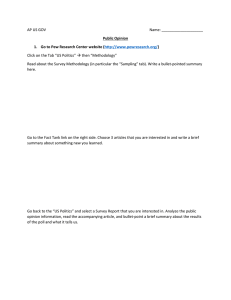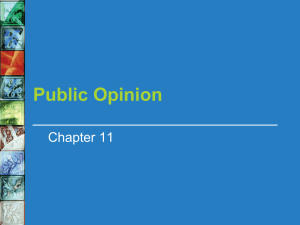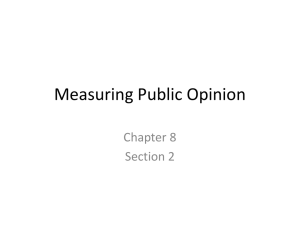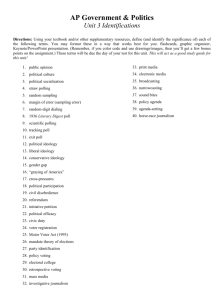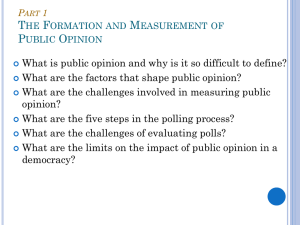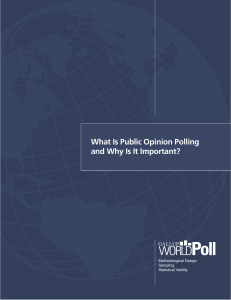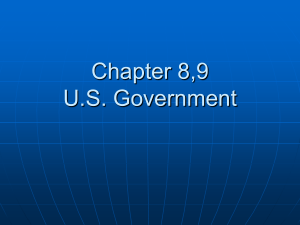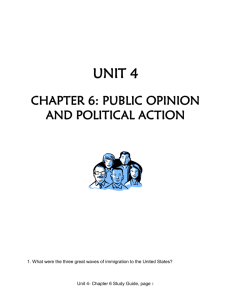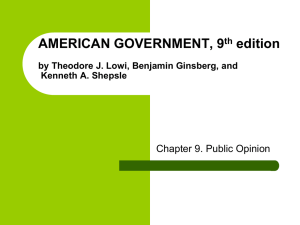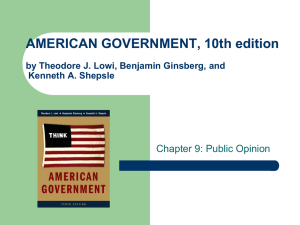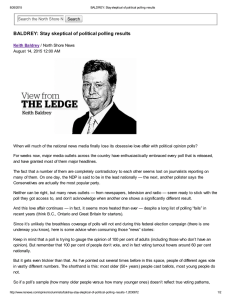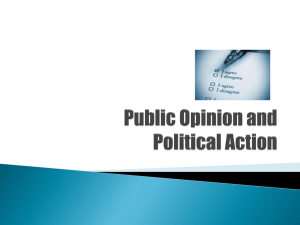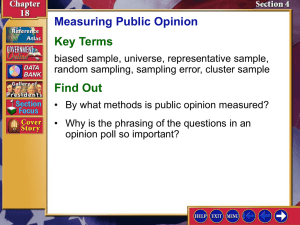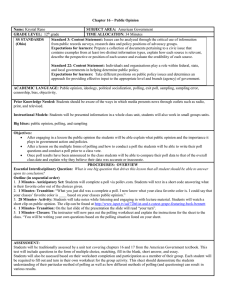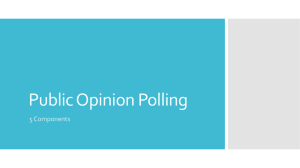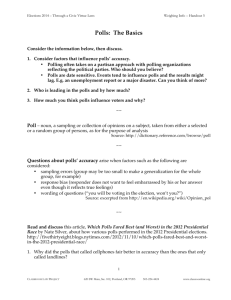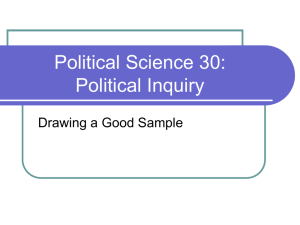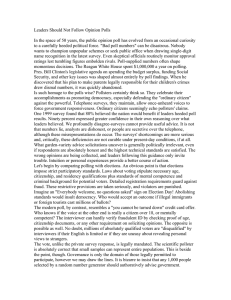VCH6
advertisement
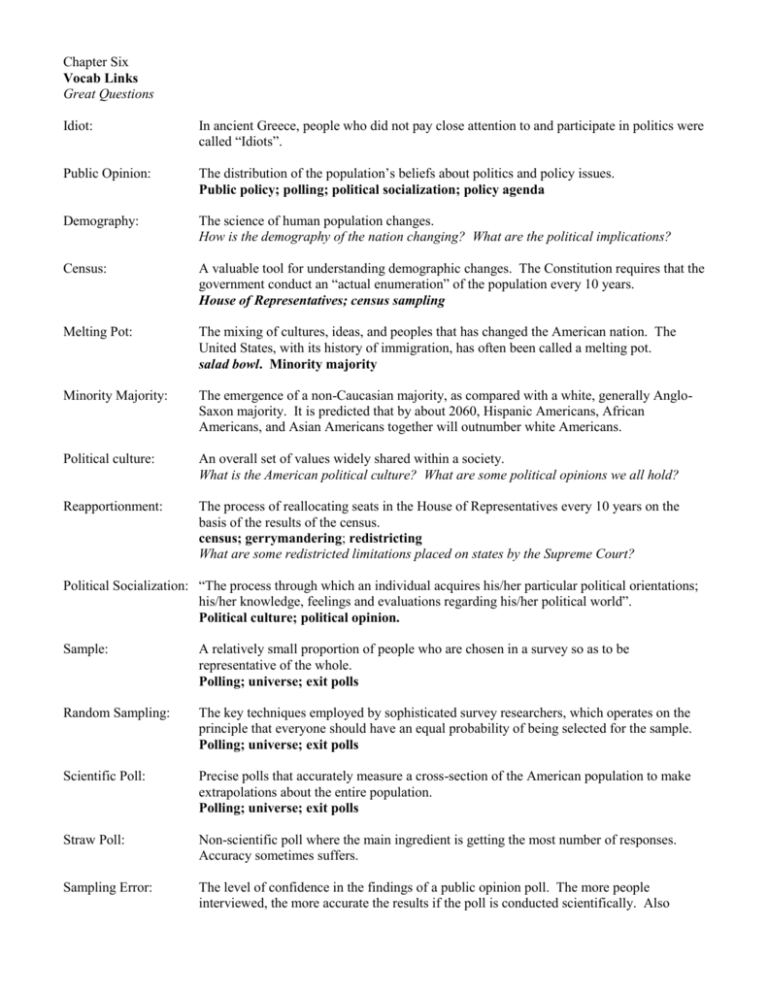
Chapter Six Vocab Links Great Questions Idiot: In ancient Greece, people who did not pay close attention to and participate in politics were called “Idiots”. Public Opinion: The distribution of the population’s beliefs about politics and policy issues. Public policy; polling; political socialization; policy agenda Demography: The science of human population changes. How is the demography of the nation changing? What are the political implications? Census: A valuable tool for understanding demographic changes. The Constitution requires that the government conduct an “actual enumeration” of the population every 10 years. House of Representatives; census sampling Melting Pot: The mixing of cultures, ideas, and peoples that has changed the American nation. The United States, with its history of immigration, has often been called a melting pot. salad bowl. Minority majority Minority Majority: The emergence of a non-Caucasian majority, as compared with a white, generally AngloSaxon majority. It is predicted that by about 2060, Hispanic Americans, African Americans, and Asian Americans together will outnumber white Americans. Political culture: An overall set of values widely shared within a society. What is the American political culture? What are some political opinions we all hold? Reapportionment: The process of reallocating seats in the House of Representatives every 10 years on the basis of the results of the census. census; gerrymandering; redistricting What are some redistricted limitations placed on states by the Supreme Court? Political Socialization: “The process through which an individual acquires his/her particular political orientations; his/her knowledge, feelings and evaluations regarding his/her political world”. Political culture; political opinion. Sample: A relatively small proportion of people who are chosen in a survey so as to be representative of the whole. Polling; universe; exit polls Random Sampling: The key techniques employed by sophisticated survey researchers, which operates on the principle that everyone should have an equal probability of being selected for the sample. Polling; universe; exit polls Scientific Poll: Precise polls that accurately measure a cross-section of the American population to make extrapolations about the entire population. Polling; universe; exit polls Straw Poll: Non-scientific poll where the main ingredient is getting the most number of responses. Accuracy sometimes suffers. Sampling Error: The level of confidence in the findings of a public opinion poll. The more people interviewed, the more accurate the results if the poll is conducted scientifically. Also known as “margin of error”: +/- 1% with a poll of 9,500+/- 3% with a poll of 1,500; +/5% with a poll of 1,000. Random Digit Dialing: A technique used by pollsters to place telephone calls randomly to both listed and unlisted numbers when conducting a survey. Exit polls: Public opinion surveys used by major media pollsters to predict electoral winners with speed and precision. bandwagon effect. What are important criticism against polling and its influence on the policy-making system? The Paradox of Mass Politics: The oddity of the American political system working as well as it does given the discomforting lack of public knowledge about politics, economics, foreign policy, etc. Political Ideology: A coherent set of beliefs about politics, public policy, and public purpose. It helps give meaning to political events, personalities, and policies. liberalism; conservatism; Gender Gap: A term that refers to the regular pattern by which women are more likely to support Democratic candidates, Women tend to be significantly less conservative than men and are more likely to support spending on social services and to oppose higher levels of military spending. Civil Disobedience: A form of political participation that reflects a conscious decision to break a law believed to be immoral and to suffer the consequences. other forms of political participation; Salad Bowl: A new term to describe, and celebrate the diversity of the United States without the controversial notion of assimilation found in the term melting pot. Bandwagon Effect: An effect caused by exit poll projections in which undecided voters turnout to support the candidate who is leading in the polls. Cross-pressure: A term used to describe being caught between two or more conflicting demographic patterns; for example: Dr. Condoleeza Rice, former National Security Advisor and current Secretary of State.
